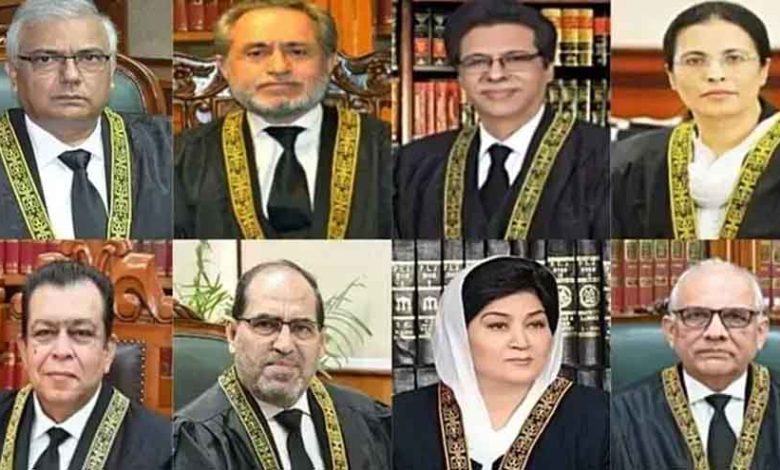CB emphasizes the need to rely on the current constitution until it is amended.

Justice Amin-ud-Din Khan of the Supreme Court (SC) stated that until any amendment is formally approved, the judiciary must depend on the current Constitution.
The Supreme Court heard petitions contesting the 26th Amendment to the Constitution in real time. Justice Amin-ud-Din Khan presided over the eight-member constitutional bench, which also included Justices Muhammad Ali Mazhar, Ayesha Malik, Hasan Azhar Rizvi, Musarrat Hilali, Shahid Bilal, Naeem Afghan, and Jamal Mandokhail. The Supreme Court’s official YouTube channel aired live coverage of the sessions.
Support the claims made by Hamid Khan.
Advocate Hamid Khan started off by pointing out that the 26th Amendment was brought to Parliament late at night. While Justice Jamal Mandokhail stated that it was premature to examine the merits of the amendment, Justice Amin-ud-Din requested him to first assist the court with the bench’s formation.
According to Hamid Khan, he was giving specific facts rather than debating the merits. He asked that a full court, comprising all 16 judges who were present at the time the 26th Amendment was ratified, hear the matter.
Hamid Khan was questioned by Justice Mandokhail about his agreement that the 26th Amendment is now a part of the Constitution. If the entire court rules against it, it will be deemed null and void from the start, Hamid Khan retorted.
According to Justice Amin-ud-Din, it is still a part of the Constitution until it is ruled invalid. “The lawyers must rely on the Constitution, just as we do. We must rely on the current Constitution until it is changed,” he stated.
“The amendment has not yet been suspended,” said Justice Musarrat Hilali.
Justice Musarrat Hilali pointed out that the amendment is still enforceable because it hasn’t been suspended, while Justice Mandokhail remarked that the petitioners had appeared before a bench established under the same amendment.
Hamid Khan was instructed by Justice Muhammad Ali Mazhar to limit his arguments to the request for a full court for the time being. Hamid Khan stated that he wanted to draw attention to how the Chief Justice’s ability to assemble benches was impacted by the 26th Amendment, pointing out that this power had been limited for the first time.
He maintained that although the Judicial Commission was already in place before to the amendment, its makeup was changed by the 26th Amendment, making judges a minority on the Commission.
Determining which bench had the jurisdiction to hear the case and whether the court could constitute a full bench under its authority were the primary concerns, according to Justice Amin-ud-Din.
Fairness “No restrictions on forming a full court through judicial order,” said Ayesha Malik.
“Where in the 26th Amendment does it say that such an order cannot be issued?” said Justice Ayesha Malik, who stated that there is no restriction on creating a complete court through a judicial order.
Justice Mazhar questioned which constitutional provision the order could be made under, speculating that Article 187 would apply, while Justice Naeem Afghan noted that Hamid Khan’s written request did not clearly mention the desire for a full court.
Hamid Khan said that the court had the authority to make such instructions under Article 187. Hamid Khan stated that the idea of a “constitutional bench” itself came from the 26th Amendment when Justice Mandokhail asked if he would be content if all Supreme Court judges were considered to be members of the constitutional bench.
Justice Mandokhail retorted that the idea was first presented by Parliament, not the courts. Hamid Khan urged the court to “forget about Article 191A for a moment,” prompting Justice Mazhar to ask rhetorically, “If we forget that, then what remains of the constitutional bench — why are we even sitting here?”
“If we forget that, the Supreme Court itself ceases to exist,” Justice Amin-ud-Din continued. How could we issue any orders if this constitutional bench didn’t exist?
The hearing was postponed till 11:30 a.m. tomorrow by the court after Hamid Khan finished his arguments.
As you may remember, following its hearing of the parties yesterday, the constitutional bench ordered live broadcasting of the proceedings. On January 27, 2025, the first hearing on petitions contesting the 26th Amendment to the Constitution took place.